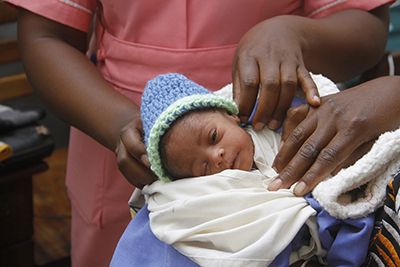
San Francisco, CA – Preterm babies born in hospitals receiving a package of quality improvement strategies aimed at care during the intrapartum period, implemented by UCSF’s East Africa Preterm Birth Initiative (PTBi EA) in Kenya and Uganda, had a 34% greater chance of surviving to 28 days compared to preterm babies born in hospitals that did not receive the intervention package. The program also led to reductions in fresh stillbirths and mortality among all babies born in intervention hospitals. PTBI EA will present these transformative findings in an upcoming webinar Transforming the Culture of Care Improves Preterm Birth Survival taking place Wednesday, July 29 at 9 am, PST.
In 2018, an estimated 2.5 million babies died before their first birthday and another 2.5 million were stillborn. Preterm birth complications are the leading cause of death among children under 5 years of age.
Funded by the Bill & Melinda Gates Foundation, this study was led by a partnership comprising of the University of California San Francisco (UCSF), Kenya Medical Research Institute, (KEMRI) and Uganda’s Makerere University. The multi-country implementation trial was designed to leverage existing resources and promote evidence-based practices to improve survival among preterm and low-birth weight babies.
The study results, available online, were published in The Lancet Global Health August issue.
“We all understand that improving quality of care around the time of birth for preterm babies and their mothers is complex,” said Dilys Walker, MD, a professor of medicine at UCSF and the principal investigator. “We chose to invest in low-tech evidence-based interventions that can be locally affordable and sustainable – more of the ‘how,’ than the ‘what.’ We already know what works, but we haven’t known how to make those interventions come together to actually change provider behavior so that outcomes for preterms and all babies are improved.”
The intervention package, introduced in four facilities in the Busoga Region of Uganda and 16 facilities in Migori County, Kenya, included four components: strengthening of maternity register data; use of a modified version of the WHO-sanctioned Safe Childbirth Checklist with increased attention to prematurity; mentoring of providers and team training using simulations; and convening of Quality Improvement Collaboratives.
“While each of these interventions alone has had some success, results have been mixed in terms of the number of maternal and newborn lives saved. Our aim was to test four components, adaptable to a variety of contexts, with the potential to synergistically promote provider behavior change at critical times during childbirth” said PTBi EA partner Phelgona Otieno, MBChB, MPH, the principal investigator for Kenya. “We believe this holistic approach to improving care at birth leads to lasting change in providers and systems and fundamentally alters the culture of care.”
“We are pleased to see these results validating the importance of real-world implementation science,” said Peter Waiswa, MBChB, PhD, principal investigator for Uganda. “Understanding local context and designing a package that did not require extraordinary investment in infrastructure, technology or additional human resources which would be challenging for the health system to sustain or scale was critical. Engaging our Ministry of Health, facility and community leadership, both early and throughout the study, also ensured increased engagement and sustainability.”
Dr. Jesca Nsungwa Sabiiti, Commissioner, Maternal and Child Health, at Uganda’s Ministry of Health, added, “Prematurity is the number one cause of neonatal mortality in Uganda and the world. This package made minimal investment in equipment and leveraged existing resources, such as personnel and data systems, to save lives.”
“While the quality of maternal care remains a challenge, this investment was successful in improving outcomes among the most vulnerable infants- those born premature,” said Amy Pollack, Director of Maternal, Newborn, & Child Health at the Bill & Melinda Gates Foundation. “There is an opportunity to build on this approach to address the root causes of poor maternal and newborn health through both known and new packages of quality improvement interventions.”
A study report sharing findings, implementation lessons learned and further insights will be published later this summer. This report will dive deeper into the study and in addition, share important data from sub-studies.
About PTBi East Africa
Since 2014, Preterm Birth Initiative East Africa (PTBi EA), an initiative of the UCSF Institute for Global Health Sciences, has brought together researchers, clinicians, parents and policymakers from Kenya, Uganda and Rwanda to identify, adapt and propagate promising strategies to address the burden of preterm birth. Preterm birth is the leading cause of death in children under five years and also the strongest risk factor for early neonatal death.
About KEMRI
The Kenya Medical Research Institute (KEMRI) is the national body responsible for carrying out health research in Kenya. Since its inception, KEMRI has developed a critical mass of scientists and technical personnel and has mounted a competitive research infrastructure, making it ranked as a leading centre of excellence in health research both in Africa and globally.
About Makerere University
Makerere University, Kampala is Uganda‘s largest and oldest institution of higher learning, first established as a technical school in 1922. It became an independent national university in 1970. Today, Makerere University is composed of nine colleges and one school offering programs for about 36,000 undergraduates and 4,000 postgraduates.